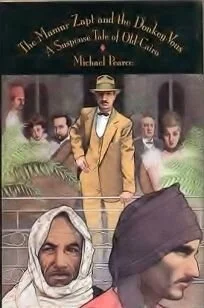An eccentric figure, McPherson would go about Cairo lost in thought as if leaving his purpose and direction to the white mule which carried him through the streets, a vision which helped endear him to his Egyptian neighbors who decided he was a seeker and a seer.
-Alexandria: City of Memory, Michael Haag
Owen wondered if they would have to move but at the last moment the mule was twitched aside…
-The Mamur Zapt and the Return of the Carpet, Michael Pearce
In Sadat’s Egypt we used to laugh at the bumbling incompetence of the Amn al-Dawlah, State Security, whose paranoia filtered so far down the chain of command that you could be arrested by a rural policeman if you photographed a donkey crossing a wobbly foot bridge over a stinky irrigation canal out in the countryside. Mamnou’ Tasawwar, Photography Forbidden, he would say, By order of State Security.




